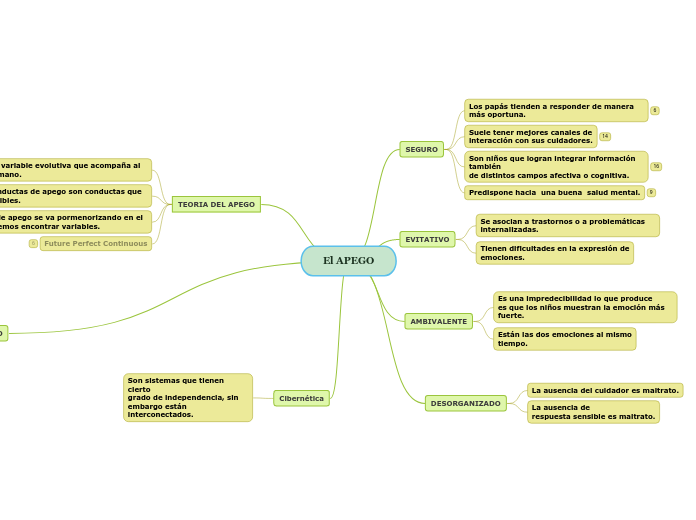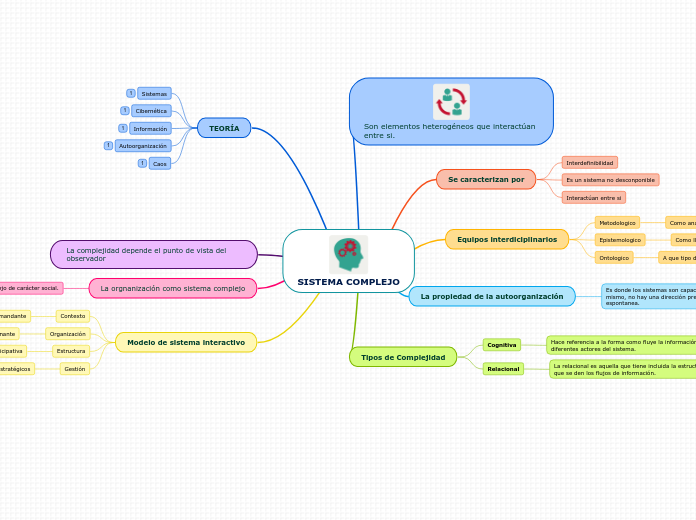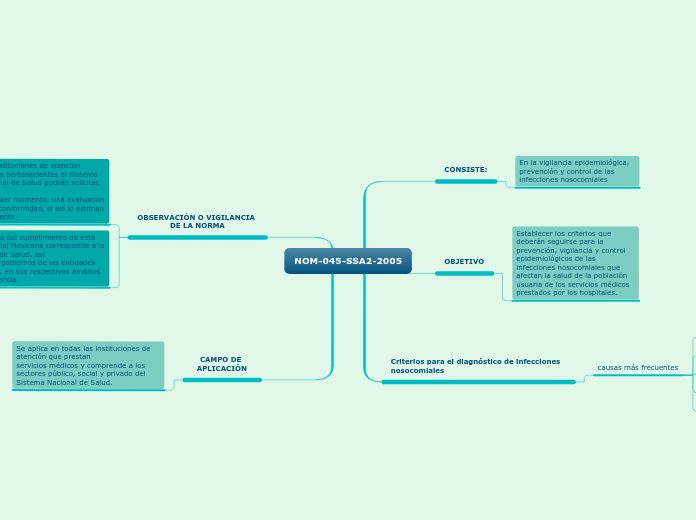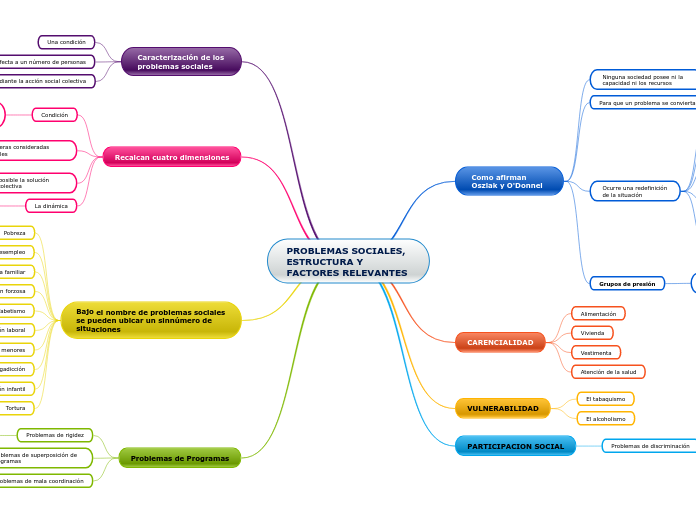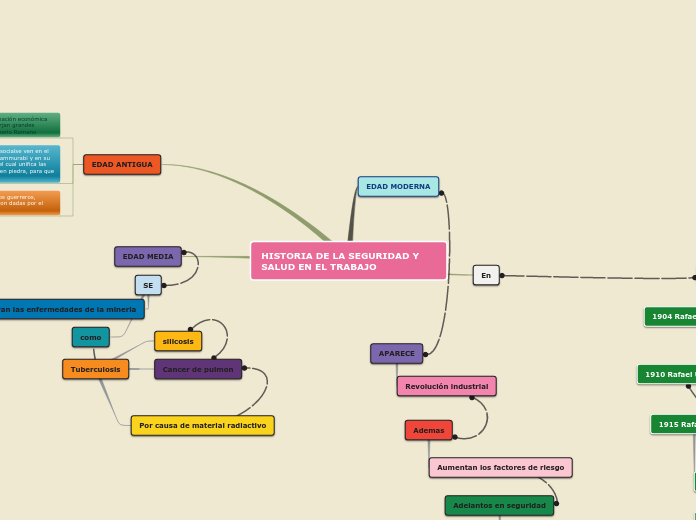El APEGO
Tenses demonstrate the time of actions centered around the subject of the sentence. These actions are called verbs and change according to tenses.
Cibernética
Son sistemas que tienen cierto
grado de independencia, sin embargo están interconectados.
SISTEMA DE APEGO
Parasimpático.
Simpático.
Autónomo.
TEORIA DEL APEGO
There are four Future tenses:
- Future Simple ('with Will' and 'with Going to')
- Future Continuous
- Future Perfect Simple
- Future Perfect Continuous
Future Perfect Continuous
Future Perfect Simple is used for:
- an action that will continue up until a point in the future
- an action that finishes just before another time or action in the future
Some adverbs used with Past Perfect Continuous for future actions:
- for
- since
- next week
- next month
- next year
Structure:
Will + Subject + Have Been + Verb-ING
e.g. How long will they be working on that project next week?
Type in your own examples or you can also choose from the examples below.
Form of word "to be":
Will I have been being?Will you have been being?Will he/she/it have been being?Will we have been being?Will you have been being?Will they have been being?
Form of word "to have":
Will I have been having?Will you have been having?Will he/she/it have been having?Will we have been having?Will you have been having?Will they have been having?
Structure:
Subject + Won’t Have Been + Verb-ING
e.g. They won’t have been working on that project for two years next week.
Type in your own examples or you can also choose from the examples below.
Form of word "to be":
I will not have been beingYou will not have been beingHe/She/It will not have been beingWe will not have been beingYou will not have been beingThey will not have been being
Form of word "to have":
I will not have been havingYou will not have been havingHe/She/It will not have been havingWe will not have been havingYou will not have been havingThey will not have been having
Structure:
Subject + Will Have Been + Verb-ING
e.g. They will have been working on that project for two years next week.
Type in your own examples or you can also choose from the examples below.
Form of verb 'to be':
I will have been beingYou will have been beingHe/She/It will have been beingWe will have been beingYou will have been beingThey will have been being
Form of verb 'to have':
I will have been havingYou will have been havingHe/She/It will have been havingWe will have been havingYou will have been havingThey will have been having
La conducta de apego se va pormenorizando en el tiempo y podemos encontrar variables.
Future Perfect Simple is used for:
- an action that will be finished by a particular time in the future
- an action that starts before and continues up to another action or time in the future
- an action that will finish before a certain time in the future, but it is not known exactly when
Adverb used with Future Continuous:
- tomorrow (e.g. tomorrow by 7)
Structure:
Will + Subject + Have + Past Participle?
e.g. Will you have met your colleague by this time tomorrow?
Type in your own examples or you can also choose from the examples below.
Form of word "to be":
Will I have been?Will you have been?Will he/she/it have been?Will we have been?Will you have been?Will they have been?
Form of word "to have":
Will I have had?Will you have had?Will he/she/it have had?Will we have had?Will you have had?Will they have had?
Structure:
Subject + Won’t Have + Past Participle
e.g. I won’t have met my friend form United States by this time tomorrow.
Type in your own examples or you can also choose from the examples below.
Form of word "to be":
I will not have beenYou will not have beenHe/She/It will not have beenWe will not have beenYou will not have beenThey will not have been
Form of word "to have":
I will not have hadYou will not have hadHe will not have hadWe will not have hadYou will not have hadThey will not have had
Structure:
Subject + Will Have + Past Participle
e.g. I will have met my friend form United States by this time tomorrow.
Type in your own examples or you can also choose from the examples below.
Form of verb 'to be':
I will have beenYou will have beenHe/She/It will have beenWe will have beenYou will have beenThey will have been
Form of verb 'to have':
I will have hadYou will have hadHe/She/It will have hadWe will have hadYou will have hadThey will have had
Las conductas de apego son conductas que son visibles.
Future Continuous is used:
- for an action that is likely to happen in the future and continue for an expected length of time
- for an action that will be in progress at some point in the future
- for action verbs (e.g. running)
- for predictions about future events
Adverb used with Future Continuous:
- tomorrow (e.g. tomorrow at 5 o'clock)
Las conductas de apego son conductas que son visibles,
Structure:
Will + Subject + Be +Verb-ING?
e.g. Will you be having fun at the party?
Type in your own examples or you can also choose from the examples below.
Form of word "to be":
Will I be being?Will you be being?Will he/she/it be being?Will we be being?Will you be being?Will they be being?
Form of word "to have":
Will I be having?Will you be having?Will he/she/it be having?Will we be having?Will you be having?Will they be having?
Structure:
Subject + Won’t Be + Verb-ING
e.g. He won’t be having fun at the party.
Type in your own examples or you can also choose from the examples below.
Form of word "to be":
I will not be beingYou will not be beingHe/She/It will not be beingWe will not be beingYou will not be beingThey will not be being
Form of word "to have":
I will not be havingYou will not be havingHe/She/It will not be havingWe will not be havingYou will not be havingThey will not be having
Structure:
Subject + Will Be + Verb-ING
e.g. You will be having fun at the party.
Type in your own examples or you can also choose from the examples below.
Form of verb 'to be':
I will be beingYou will be beingHe/She/It will be beingWe will be beingYou will be beingThey will be being
Form of verb 'to have':
I will be havingYou will be havingHe/She/It will be havingWe will be havingYou will be havingThey will be having
Es una variable evolutiva que acompaña al ser humano.
Future Simple is used:
- to predict an event in the future
- to invite
- to give orders
- to express willingness
- for actions that have not yet occurred but that will occur at a future date
"Going to"
'Going to' Future is used:
- to talk about our future intentions and plans
- for commands
Some adverbs used with 'Going to' Future:
- later
- tonight
- tomorrow
- next week
- next month
- next year
Structure:
BE + Subject + going to + Infinitive Form of Verb?
e.g. Are you going to read the whole book over the weekend?
Type in your own examples or you can also choose from the examples below.
Form of word "to be":
Am I going to be?Are you going to be?Is he/she/it going to be?Are we going to beAre you going to be?Are they going to be?
Form of word "to have":
Am I going to have?Are you going to have?Is he/she/it going to have?Are we going to haveAre you going to have?Are they going to have?
Structure:
Subject + BE not + going to + Infinitive Form of Verb
e.g. He isn't going to spend his vacation in Hawaii.
Type in your own examples or you can also choose from the examples below.
Form of word "to be":
I am not going to beYou are not going to beHe/She/It is not going to beWe are not going to beYou are not going to beThey are not going to be
Form of word "to have":
I am not going to haveYou are not going to haveHe/She/It is not going to haveWe are not going to haveYou are not going to haveThey are not going to have
Structure:
Subject + BE (am/is/are) + going to + Infinitive Form of Verb
e.g. She’s going to be a professional dancer when she grows up.
Type in your own examples or you can also choose from the examples below.
Form of verb 'to be':
I am going to beYou are going to beHe/She/It is going to beWe are going to beYou are going to beThey are going to be
Form of verb 'to have':
I am going to haveYou are going to haveHe/She/It is going to beWe are going to beYou are going to beThey are going to be
"Will"
Future Simple with 'will'' is used:
- to predict the future
- for something with absolute certainty
- when we're talking about a decision at the moment of speaking
- promises, requests, refusals, offers
- future facts
Some adverbs used with Future Simple:
- tomorrow
- next week
- next month
- next year
Structure:
Will + Subject + V1(First Form of Verb)?
e.g. Will you see Mary when she comes back from Denmark?
Type in your own examples or you can also choose from the examples below.
Form of word "to be":
Will I be?Will you be?Will he/she/it be?Will we be?Will you be?Will they be?
Form of word "to have":
Will I have?Will you have?Will he/she/it have?Will we have?Will you have?Will they have?
Structure:
Subject + Won’t (will not) + V1(First Form of Verb)
e.g. You won’t see Mary when she comes back from Denmark.
Type in your own examples or you can also choose from the examples below.
Form of word "to be":
I will not beYou will not beHe/She/It will not beWe will not beYou will not beThey will not be
Form of word "to have":
I will not haveYou will not haveHe/She/It will not haveWe will not haveYou will not haveThey will not have
Structure:
Subject + Will + V1(First Form of Verb)
e.g. I will see Mary when she comes back from Denmark.
Type in your own examples or you can also choose from the examples below.
Form of verb 'to be':
I will beYou will beHe/She/It will beWe will beYou will beThey will be
Form of verb 'to have':
I will haveYou will haveHe/She/it will haveWe will haveYou will haveThey will have
DESORGANIZADO
There are four Past tenses:
- Past Simple
- Past Continuous
- Past Perfect Simple
- Past Perfect Continuous
La ausencia de
respuesta sensible es maltrato.
Past Continuous is used for:
- an action that happened before another action in the past
- an action that started in the past and continued up to a given time in the past
- an action done several times up to a point in the past and continued to do after that point
- an action that happened in the past but is important at the time of reporting
Some adverbs used with Past Continuous:
- always, only, never, ever, still, just
La ausencia del cuidador es maltrato.
Past simple expresses:
- an action that happened in the past and has no connection with the present
- an action that happened once in the past
- an action that happened regularly in the past
- an action that was true for some time in the past
- an event or action that already occurred
- an action that is finite - has both a starting and a stopping point
Some adverbs used with Past Simple:
- yesterday
- last month, last year
- ago (e.g. two days ago)
- in (e.g. in 1997)
- never, always, seldom, often, frequently, occasionally, once, twice
AMBIVALENTE
Están las dos emociones al mismo
tiempo.
Es una impredecibilidad lo que produce
es que los niños muestran la emoción más fuerte.
EVITATIVO
Tienen dificultades en la expresión de
emociones.
Se asocian a trastornos o a problemáticas internalizadas.
SEGURO
There are four Present tenses:
- Present Simple
- Present Continuous
- Present Perfect
- Present Perfect Continuous
Predispone hacia una buena salud mental.
Present Perfect Continuous is used:
- to describe an action that started in the past and has continued up to the present
- to describe an action that has just finished
Some adverbs used with Present Perfect Continuous:
- always
- only
- never
- ever
- still
- just
predisponente hacia la salud mental
Structure:
Have/ has + Subject + been Verb-ING?
e.g. How long has he been learning German?
Type in your own examples or you can also choose from the examples below.
Form of word "to be":
Have I been being?Have you been being?Has he/she/it been being?Have we been being?Have you been being?Have they been being?
Form of word "to have":
Have I been having?Have you been having?Has he/she/it been having?Have we been having?Have you been having?Have they been having?
Structure:
Subject + haven’t/hasn’t been + Verb-ING
e.g. She hasn’t been playing tennis for a long time.
Type in your own examples or you can also choose from the examples below.
Form of word "to be":
I have not been beingYou have not been beingHe/She/It has not been beingWe have not been beingYou have not been beingThey have not been being
Form of word "to have":
I have not been havingYou have not been havingHe/She/It has not been havingWe have not been havingYou have not been havingThey have not been having
Structure:
Subject + have/ has been + Verb-ING
e.g. They have been learning French for two years.
Type in your own examples or you can also choose from the examples below.
Form of verb 'to be':
I have been beingYou have been beingHe/She/It has been beingWe have been beingYou have been beingThey have been being
Form of verb 'to have':
I have been havingYou have been havingHe/She/It has been havingWe have been havingYou have been havingThey have been having
Son niños que logran integrar información también
de distintos campos afectiva o cognitiva.
Present Perfect is used for:
- an action that occurred at a time which is indefinite and has its effect on the subject
- an action that occurred many times and has the possibility to occur in the present/future
- an action that began in the past and is still going on in the present
Some adverbs used with Present Perfect:
- just
- already
- yet
- for
- never/ever
- up to now
de distintos campos afectiva o cognitiva
son niños que logran integrar información también
Structure:
Have/ has +Subject+ Past Participle?
e.g. Has she finished the letter?
Type in your own examples or you can also choose from the examples below.
Form of word "to be":
Have I been?Have you been?Has he/she/it been?Have we been?Have you been?Have they been?
Form of word "to have":
Have I had?Have you had?Has he/she/it had?Have we had?Have you had?Have they had?
Structure:
Subject + haven’t (have not)/ hasn’t (has not) + Past Participle
e.g. She hasn’t finished the letter.
Type in your own examples or you can also choose from the examples below.
Form of word "to be":
I have not beenYou have not beenHe/She/It has not beenWe have not beenYou have not beenThey have not been
Form of word "to have":
I have not hadYou have not hadHe has not hadWe have not hadYou have not hadThey have not had
Structure:
Subject + have/ has + Past Participle (3rd Form of the Verb)
e.g. She has finished the letter.
Type in your own examples or you can also choose from the examples below.
Form of verb 'to be':
I have beenYou have beenHe/She/It has beenWe have beenYou have beenThey have been
Form of verb 'to have':
I have hadYou have hadHe/She/It has hadWe have hadYou have hadThey have had
Suele tener mejores canales de
interacción con sus cuidadores.
Present Continuous is used to indicate the ongoing time (now).
Some adverbs used with Present Continuous:
- now, right now
- at this moment
- at the moment
- continually
- perpetually
- this year
- this season
- forever
interacción con sus cuidadores
suele tener mejores canales de
Structure:
BE + Subject + Verb-ING?
Are you eating now?
Type in your own examples or you can also choose from the examples below.
Form of word "to be":
Am I being?Are you being?Is he/she/it being?Are we being?Are you being?Are they being?
Form of word "to have":
Am I having?Are you having?Is he/she/it having?Are we having?Are you having?Are they having?
Structure:
Subject + BE not + Verb-ING
e.g. You are not eating now.
Type in your own examples or you can also choose from the examples below.
Form of word "to be":
I am not beingYou are not beingHe/She/It is not beingWe are not beingYou are not beingThey are not being
Form of word "to have":
I am not havingYou are not havingHe/She/It is not havingWe are not havingYou are not havingThey are not having
Structure:
Subject + BE (am/is/are) + Verb-ING
e.g. You are eating now.
Type in your own examples or you can also choose from the examples below.
Form of verb 'to be':
I am beingYou are beingHe/She/It is beingWe are beingYou are beingThey are being
Form of verb 'to have':
I am havingYou are havingHe/She/It is havingWe are havingYou are havingThey are having
Los papás tienden a responder de manera más oportuna.
Present Simple is used for:
- habits
- general truths
- repeated actions of events
- fixed arrangements/timetables
- feelings/opinions/beliefs
- instructions.
Some adverbs used with Present Simple:
- always
- usually
- seldom
- never
- sometimes
- often
- frequently, generally
- habitually, occasionally
- once, twice
Interrogative form
Structure:
Do + Subject (I, You, We, They)+ V1 (First Form of Verb)?
Does + Subject (He, She, It)+V1 (First Form of Verb)?
e.g. Where does he work?
Type in your own examples or choose from the examples below.
Form of word "to be":
Am I?Are youIs he/she/it?Are we?Are you?Are they?
Form of word "to have":
Have I?Have youHas he/she/it?Have we?Have youHave they?
Negative form
Structure:
Subject (I, You, We, They) + do not / don’t + V1 (First Form of Verb)
Subject (He, She, It) + does not / doesn’t + V1 (First Form of Verb)
e.g. He doesn’t work in a bank.
Type in your own example or choose from the examples below.
Form of word "to be":
I am notYou are notHe/She/It is notYou are notWe are notThey are not
Form of word "to have":
I do not haveYou do not haveHe/She/It does not haveWe do not haveYou do not haveThey do not have
Affirmative form
Structure:
Subject (I, You, We, They) + V1(First Form of Verb)
e.g. I usually go jogging at weekends.
Subject (He, She, It)+ V1(First Form of Verb) + s/es
e.g. She writes every day.
Examples
Type in your own examples or you can also choose from the examples below.
Form of verb "to be":
I amYou areHe/she/it isWe areYou areThey are
Form of verb "to have":
I haveYou haveHe/she/it hasWe haveYou haveThey have
